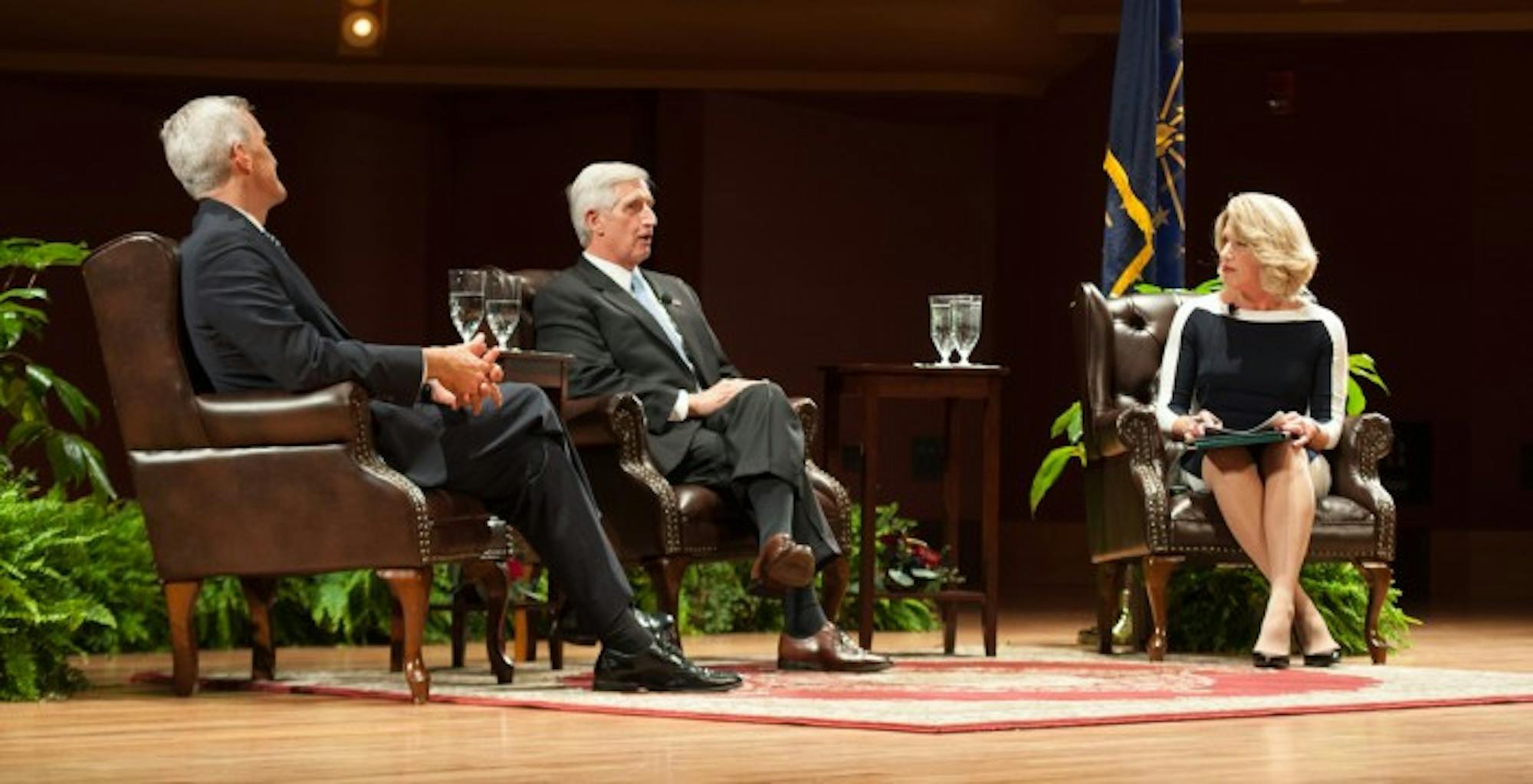This year’s keynote Notre Dame Forum event, “Views from the West Wing: How Global Trends Shape U.S. Foreign Policy” was held Wednesday night in the Leighton Concert Hall in the DeBartolo Performing Arts Center. Moderated by Maura Policelli, executive director of the Notre Dame Keough School of Global Affairs’ Global Policy Initiative, the keynote speakers were Andrew Card and Denis McDonough, chiefs of staff to Presidents George W. Bush and Barack Obama, respectively.
Scott Appleby, the Marilyn Keough Dean of the Keough School of Global Affairs, began by welcoming the audience and introducing University president Fr. John Jenkins.
“We will consider tonight how presidential decisions and U.S. foreign policy shape and are shaped by global trends and patterns as well as the immediate crises and opportunities presented by the events unfolding today,” Jenkins said.
Jenkins then introduced the two speakers and the moderator.
Card served as chief of staff to Bush from November 2000 to April 2006, the longest serving White House chief of staff in the modern era. He played an important role during significant events such as the 9/11 attacks; Card was the man who famously informed Bush of the attacks.
In Obama’s first term, McDonough worked on the National Security Council. In this position, he was involved in the organization and planning of the Navy SEAL raid that led to the death of Osama bin Laden. Appointed Obama’s chief of staff in 2013, McDonough is currently an executive fellow of the Global Policy Initiative in the Keough School.
Policelli has backgrounds in Washington, D.C., too. Prior to becoming executive director of the Global Policy Initiative, she served as chief of staff for representatives Gabrielle Giffords and Jane Harman and worked at Oxfam America.
She began by asking Card and McDonough about the greatest challenge a chief of staff faces. Both speakers emphasized calm, collected decision making.
“Making sure the president is available to make a brutally tough decision at any time at any day,” Card said.
McDonough agreed — saying that the president sometimes needs to make a decision immediately, sometimes in the middle of the night.
“The most important thing is make sure you’re sensitive to the president’s time,” he said. “Don’t overload him with decisions he doesn’t need to make, but the decisions he does need to make, give him the information he needs.”
McDonough and Card were also asked questions regarding team organization.
McDonough said he asked all living chiefs of staff for advice before assuming the position. Card referred to the leadership tactics needed to govern the president’s staff.
“The chief of staff’s job is to manage those people so that they don’t abuse the president or process,” Card said. “Make sure their tunnel vision wasn’t used without the context of peripheral vision.”
Policelli next addressed some of the more recent controversies to come out of White House in regards to executive power, including engaging Congress in order to use military force.
“It’s difficult to get, but it’s important to get because the Constitution calls for it,” McDonough said.
“Debatable,” Card said.
The two former chiefs of staff agreed about the dangers of the Trump administration's communications strategy and also said they want to see the president succeed.
“Taste your words before you spit them out,” Card said. “The words that a president uses are very, very significant. They impact the White House staff, they create a climate that Congress then has to consider, they motivate people, they generate emotion and they sometimes call others to action.”
“A particular result I think we need is a return to more civil discourse, of the type that I often have with Andy,” McDonough said. “Particularly in light of what’s happening in Washington, I think there is a great responsibility on us to return to civil discourse.”
The keynote concluded with questions from undergraduate and graduate students, including one regarding how Card and McDonough approached harsh sentiments of Islamophobia following international terrorist attacks.
Junior Ben Foley, who attended the keynote, found this question the most interesting.
“I think [Card and McDonough] both had very optimistic views for the future while also addressing how American citizens were suspicious of their neighbors following the 9/11 attacks, saying we were united, but still divided,” he said.
Card specifically addressed Bush’s blunder of calling the war on terror, “a crusade.”
“We worked very hard to show that Islam has many good things in its faith,” Card said. “This is not a campaign against Muslims. He tried to overcome any bias that was created because of the attacks. It was a hard thing to do.”
“There is great strength in our diversity and it is incumbent on all of us to protect that,” McDonough added. “There’s nothing more empowering than to see the picture of Fr. Ted with Dr. King on campus. Notre Dame has taken a particular role in the country in serving as a conscience for that strength through diversity over time, and I have every confidence that you all will continue that.”
Former chiefs of staff address foreign affairs
The Observer | Chris Collins
Former White House chiefs of staff Denis McDonough, left, and Andrew Card, right, speak at a lecture Wednesday in DeBartolo Performing Arts Center. The two discussed presidential decision making and American foreign policy.









